
9 minute read
Maternal Merit
Maternal Merit
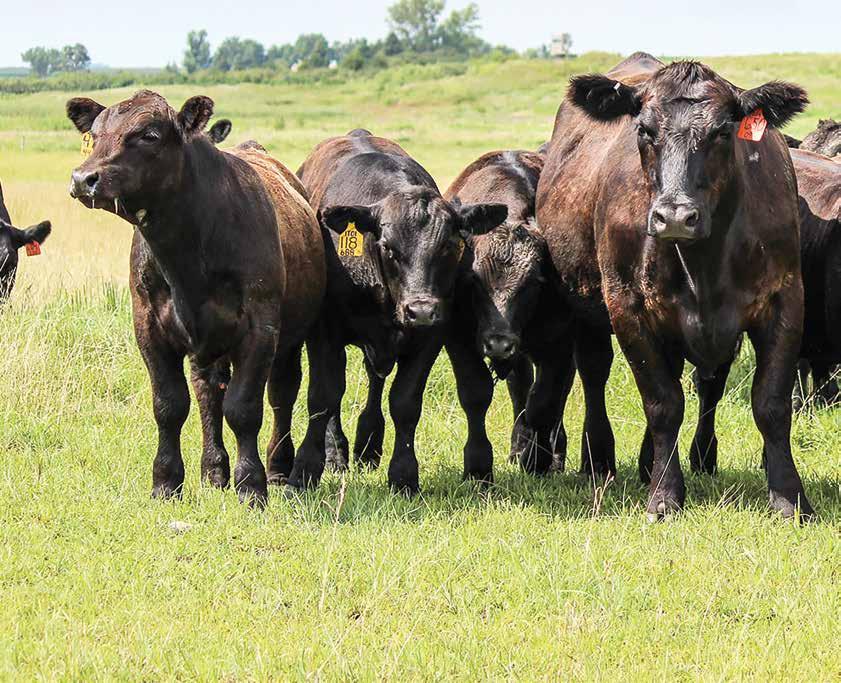
by Melissa McGee Buehler & Katie Johnson photos courtesy Chestnut Angus Farm
Chestnut Angus Farm builds on maternal excellence in Minnesota.
The beautiful, rolling plains of southwestern Minnesota lay claim to some of the top seedstock producers in the cattle industry. There, nestled between South Dakota and Iowa, near the small town of Pipestone, MN, is where Chestnut Angus Farm calls home.
Chestnut Angus was established in 1994, with the union of Glenn and Sherri Johnson. When the two married, cow herds were also united. Sherri (Butman) Johnson brought six cows that she owned from the Cottonwood Angus Farms herd to blend with Glenn’s established herd of 35-40 head. As they settled into a new life together, Sherri’s father encouraged them to choose a name unique to their operation. After noticing their farm site to be the only place in the area that grew chestnut trees, Chestnut Angus Farm was established.
Growing up, Glenn’s father raised pigs before the purebred cattle came into the picture. Glenn and his dad farrowed out about 120 Spotted Poland China and Duroc gilts each year and sold approximately 65 boars to producers in the surrounding area. They also fed out about 40 steers annually. Glenn bought his first purebred Angus heifer when he was just a sophomore in high school, ironically, from Cottonwood Angus Farm. Sherri was no stranger to the Angus breed, having been involved in the family business her entire life.
Today, the operation includes Glenn and Sherri’s two sons, Wesly and Dawson, as well as, their hired man of nearly five years, Justin Blumer. Glenn commented that without the help of the entire family, the operation would not be able to run at the level it does. They are also fortunate to have helpful neighbors and close friends willing to assist with seasonal duties whenever asked.

High quality females raise high quality calves at Chesnut Angus Farm. Photo courtesy Katie Bennett.
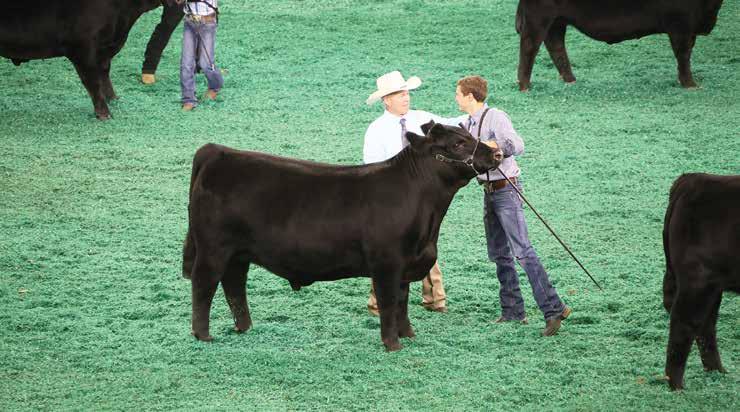
The youngest of the Chesnut Angus crew, Dawson Johnson, took home Champion Angus Steer honors at the 2019 National Junior Angus Show.
Wesly is a senior at South Dakota State University (SDSU) and is currently on the livestock judging team. He has been involved in the operation since he was old enough to walk and was named National Junior Angus Herdsman of the Year in 2018. Over the last three to four years, the Johnsons have made sire selections together, but left the mating decisions largely to Wesly. Glenn adds, “mating decisions, sale selections, and show entries are a team effort, but we let Wesly have the final say. A banner means a little more to all of us if the boys are involved in the operation.” Dawson exhibited the Champion Angus Steer at the 2019 National Junior Angus Show along with the Champion Angus Heifer and Reserve Champion Supreme Female in the 4-H Show at the 2019 Minnesota State Fair. He is a senior at Pipestone Area High School and prefers to be involved in the field work end of the things. “He is more interested in anything on wheels with an engine,” says Glenn.
In addition to the cattle, the Johnsons keep busy with 1,200 acres of corn and soybeans, 300 acres of alfalfa, and about 70 acres of oats used for feed and bedding. The rich grasslands of southwest Minnesota will support a cow/calf pair on only three acres, when not covered in snow. So, the Johnsons work to raise all of their own hay hopefully with a little extra to sell as well.

2018 Black Hills Stock Show Champion Angus Heifer.
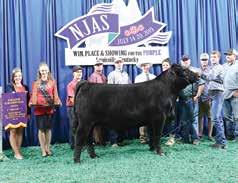
2019 National Junior Angus Show Champion Angus Steer.

2019 MN State Fair 4H Show Reserve Champion Supreme Heifer.
Glenn and Sherri have always been partial to Angus cattle because they believe in their maternal abilities - longevity, feed efficiency, and capacity to be successful when outcrossed with other breeds. Glenn commented, “We feel they are marketable whether used as feeder cattle or breeding stock, and that makes Angus the obvious choice.” Glenn has noticed over the years, that no matter what kind of cattle they have had in the herd alongside the Angus, they never seem to perform as well as the Angus calves at weaning, even if they appeared bigger.
In today’s industry, where there is extensive use of embryo transfer and in-vitro fertilization, Johnsons do little to no embryo work within their own herd. Sherri stated, “we let our best cows lead us and we’ve always had better luck with natural selection.” Glenn added, “Our goal with flushing was to produce donor quality females, but we found the females born naturally to be far more fertile than the embryo calves we raised.” In fact, almost all Chestnut Angus calves are natural-born offspring, and rarely do they have sets of full brothers or sisters in a contemporary group. “An old buck once told me never to breed a cow the same way twice,” said Glenn. “After giving that a lot of thought, we changed up our program. A good cow will always prevail through the quality of her progeny regardless of the mating.”
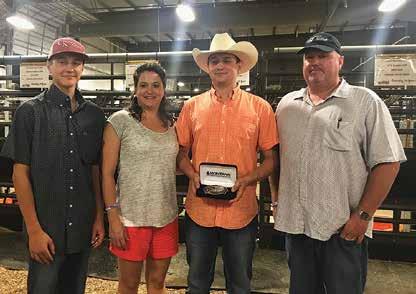
The Johnson Family: (l-r) Dawson, Sherri, Wesly, and Glenn Johnson.
Technology has had a great impact in data utilization and the use of EPDs at Chestnut Angus. With it, they are able to select for traits that impact breeding decisions and generate cattle that ultimately match the paper to the animal phenotypically. Glenn notes that data is not their sole source for selection criteria. “There needs to be a balance in visual appraisal and genetic merit. We consider our marketing area, potential customer needs and use plain old, good sense rather than just chase numbers,” said Glenn. “In my opinion, when we went to breeding more carcass cattle, we began to lose feet, legs, udder quality, and longevity; that just didn’t work for us.”
- “A good cow will always prevail through the quality of her progeny regardless of the mating.” - Glenn Johnson, Chestnut Angus Farm
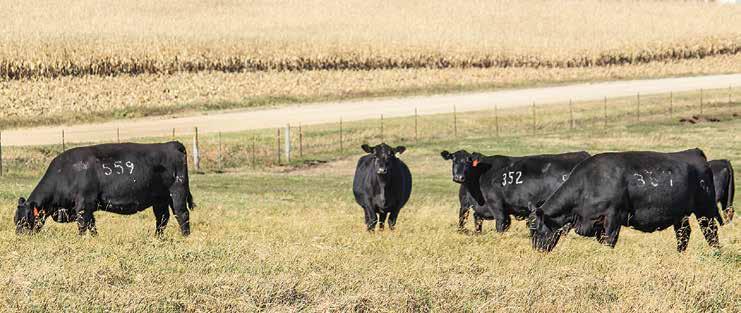
Females on picture day prior to their annual Elite Female Sale held each year in November. Photo courtesy Katie Bennett.
_____
The Johnsons have been fortunate to raise bulls that have gone on to do some note worthy things within the beef industry. Namely, Chestnut Knockout 204 was a member of the 2015 Reserve Champion Pen of Three bulls at the National Western Stock Show and has been used extensively in their cow herd. In his rookie calving season, Knockout sired the Grand Champion Pen of heifers at the 2017 National Western Stock Show (NWSS), as well as, several members of both the Reserve Champion Early and Reserve Champion Late pen of Bull Calves at the 2017 NWSS. After Knockout daughters entered production, the Johnsons were even more impressed. “The foot quality, udder quality, disposition, and mothering ability has been second to none, these are the leading females in our herd today,” stated Glenn. Knockout and his daughters have gone on to produce top-end bulls and females that have been successful at the highest level not only for Chestnut Angus but also several other breeders across the country.

Chesnut Angus pairs make their way across a Minnesota pasture. Photo courtesy Katie Bennett.
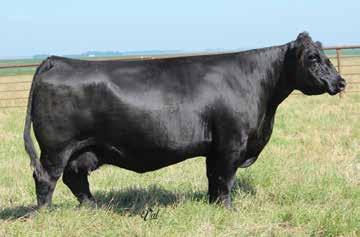
Herd matron, WJ Peg 9589, pictured here at nine years of age.
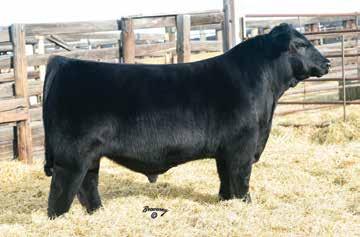
Chesnut Knockout 204, pictured as a yearling.
The Chestnut Angus Farm location allows them to cater to a mix of customers, commercial operations and registered breeders alike. 2020 will mark their 22nd Annual Production Sale (last Wednesday in February), which includes 60 bulls and a handful of later calving females. They also hold an Elite Female Sale each Fall (Black Friday) offering select open heifers for show prospects, bred heifers, and mature cows with various calving times to appeal to a broader audience.
Like every producer, Chestnut Angus has had some cornerstone females that they could write pages about who have helped to propel the operation forward. One such dam, Beauty 319, is a 16-year-old herd matron carrying a calf to be born in 2020. Females like her make a lasting impact in a herd with their consistency, longevity and high level of production. The Peg cow family, time and time again, has continued to produce bulls and females that always rise to the forefront moving Chestnut’s program and their customers’ programs forward in an effective way. “It is a testament to the cow, giving them the opportunity to produce quality year after year. We believe in that versatility and maternal power,” says Sherri.
Currently, the Johnsons are members of the American Angus Association, with their two sons also active in the National Jr. Angus Association. For over 8 years, Sherri and Glenn have served as advisors for the Minnesota Junior Angus Association, while Glenn also serves as Vice President of the Minnesota Angus Association. They are also members of the Minnesota State Cattlemen’s Association and the National Cattlemen’s Beef Association. “It’s important to stay involved, support, and be an activist for our agricultural community during a time when consumers are so distant from understanding what actually happens within the industry,” commented Glenn. “Plus, best friends are made over shared passions - cattle and kids.”
learn more chestnutangus.com
Chestnut Angus Farm will hold its Elite Female Sale on November 29, 2019 at the farm near Pipestone, MN. For more information contact Glenn at 507.820.1502.

2017 NWSS Champion Pen of Heifers sired by Chestnut Knockout 204.
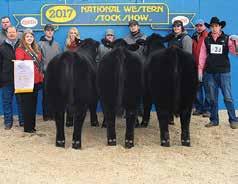
2017 NWSS Reserve Champion Early Pen of Bulls.

2017 NWSS Reserve Champion Late Pen of Bulls.



